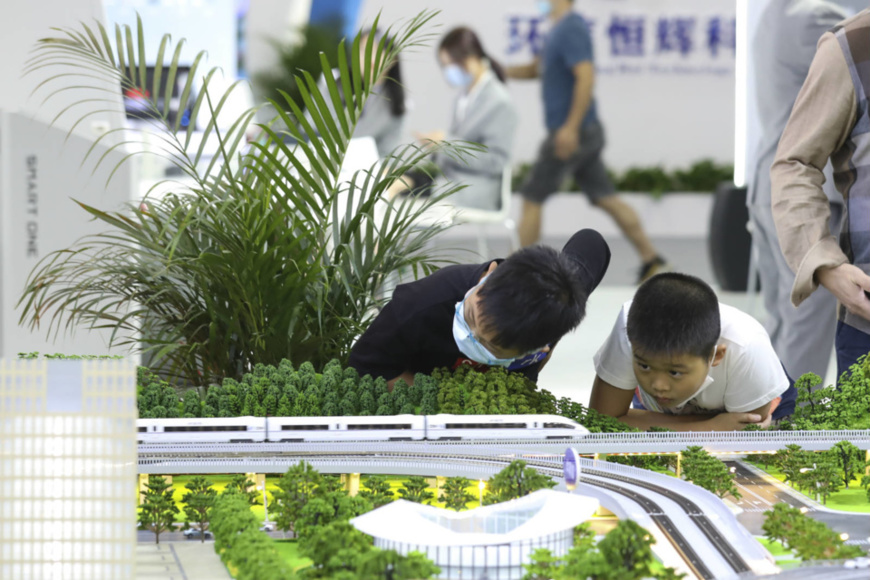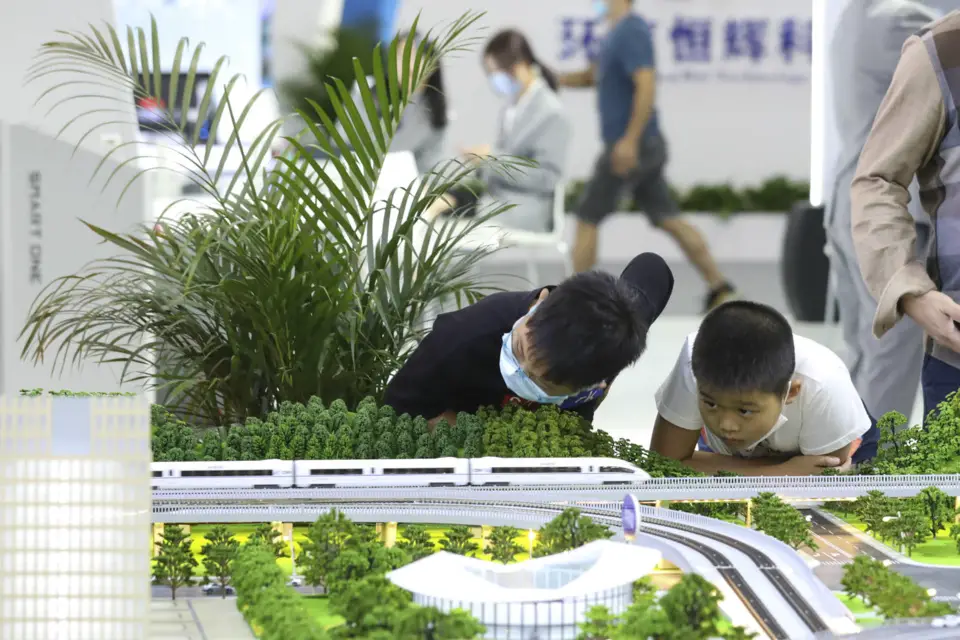By Yan Ke, Zhong Ziwei, Shao Yuzi, People’s Daily

Photo taken on the afternoon of October 11 shows children watching a demonstration of China Railway High-speed (CRH) trains at the 3rd Digital China Summit. (Photo by Xie Guiming/People’s Daily Online)
The 3rd Digital China Summit concluded in Fuzhou, capital of east China’s Fujian province, on October 14.
Over 8,000 participants attended the main forum and sub-forums of the summit and more than 200 companies exhibited their latest digital technologies and results.
A total of 426 projects in the digital sector involving an investment of 331.6 billion yuan (about $49.5 billion) were signed at this year’s Digital China Summit.
The COVID-19 epidemic has underlined the necessity and urgency of digital transformation.
The application of big data and artificial intelligence (AI) has greatly improved China’s capacity for prediction, diagnosis and treatment of the COVID-19 pandemic, said Zhong Nanshan, academician at the Chinese Academy of Engineering as well as recipient of China’s Medal of the Republic, via video link during the summit.
“At the very beginning of the outbreak, we learnt about the incubation period and clinical features of the disease based on the big data on more than 1,000 COVID-19 patients across the country, which played an important role in the early diagnosis and identification of the epidemic,” Zhong noted.
“During the epidemic, we called Chinese families and informed them about epidemic prevention and control with the help of AI technology,” said Liu Qingfeng, chairman of iFLYTEK Co. Ltd., a Chinese information technology company.
The technology has enabled the company to inform the first one million families within six hours, according to Liu, who disclosed that the technology has served 59 million person-times of people across the country.
How should China continue stimulating the vitality of digital technologies in the future?
Huawei’s rotating chairman Xu Zhijun spoke highly of China’s efforts to speed up the construction of new infrastructure.
In the short term, new infrastructure can help stabilize the economy and ensure steady growth; in the long run, new infrastructure can stimulate more new demands, create more new forms of businesses, and release more driving forces and potential in promoting the upgrading of economy, laying a solid foundation for digital transformation in various industries and the high-quality development of different cities, he explained.
Robin Li, chairman and CEO of Baidu, believes that smart economy will be the new label on China’s digital economy in the next 10 years, as all sectors, industries and fields will be developing toward intelligentization.
In the first half of this year, China’s online retail sales increased by 7.3 percent year on year, according to Xi Dan, senior vice president at Tencent, who pointed out that digitalization in the entire consumer side is still accelerating.
Xi talked about the new changes brought about by digital economy to the consumer side, among which digital consumption’s expanding into new markets in lower-tier cities and rural areas represents both a new trend and new vitality of the economy.
Farmers in remote areas began to sell agricultural and sideline products through the Internet and shops in small cities are rapidly recovering with the help of digital platforms, Xi noted.
During the recent combined National Day and Mid-Autumn Festival holiday, the total WeChat payment transaction volume in third-tier cities and below rose by 50 percent, he added.
The achievement expo of the 3rd Digital China Summit, which demonstrates the digital life in the future, had been very popular among visitors since its opening.
As an important part of the summit, the achievement expo covered an area of 56,000 square meters and gathered 257 enterprises and government departments at home and abroad.
The achievement expo included seven major theme zones featuring such topics as the role of digital technologies in the fight against the COVID-19 epidemic, digital economy, and digital society, as well as three sections for the release of relevant achievements.
The expo has comprehensively shown China’s achievements in the digitalization, internetization and intelligentization in various sectors during the country’s economic and social development.
Over 50 percent of the new technologies and products released at the expo were introduced to the public for the first time.
The benefits of digitalization are mirrored in the smarter lifestyle of people, such as intelligent garbage classification and targeted power grid services.
A technology company in Fuzhou introduced a smart waste sorting bin at the expo. The dustbin can automatically open after the users have their faces scanned by the device or scan the QR code on the dustbin.
Thanks to its intelligent system, users can know the weight of their waste, track the recycling process of recyclable waste, and get detailed information about the recycling network system.
With the help of new technologies such as the Internet of Things (IoT) and AI, staff workers at the State Grid Fujian Electric Power Co., Ltd. could quickly locate the addresses of clients with electricity demands through a power supply capacity visualization platform and promptly make a power supply plan for these clients based on big data-driven maps.
Increasing roles of digital technologies in the development of traditional industries have fostered new strengths in various fields.
“Through a smart agricultural IoT platform, we can now collect and input data about tea production throughout the whole process from plucking to drying tea leaves,” said a worker with Fujian Chunlun Tea group Co., Ltd. at the expo.
The Fuzhou Strait International Conference & Exhibition Center, main venue of the 3rd Digital China Summit, is fully covered by 5G signals and supports a batch of smart application scenarios such as facial recognition payment, subway facial recognition, and smart parking, according to an executive of the expo during the summit, adding that nearly 100,000 participants visited the main venue during the summit.
With the establishment of the summit’s first online exhibition platform this year, people can visit the grand occasion online and offline all year round, said the executive.
Over 8,000 participants attended the main forum and sub-forums of the summit and more than 200 companies exhibited their latest digital technologies and results.
A total of 426 projects in the digital sector involving an investment of 331.6 billion yuan (about $49.5 billion) were signed at this year’s Digital China Summit.
The COVID-19 epidemic has underlined the necessity and urgency of digital transformation.
The application of big data and artificial intelligence (AI) has greatly improved China’s capacity for prediction, diagnosis and treatment of the COVID-19 pandemic, said Zhong Nanshan, academician at the Chinese Academy of Engineering as well as recipient of China’s Medal of the Republic, via video link during the summit.
“At the very beginning of the outbreak, we learnt about the incubation period and clinical features of the disease based on the big data on more than 1,000 COVID-19 patients across the country, which played an important role in the early diagnosis and identification of the epidemic,” Zhong noted.
“During the epidemic, we called Chinese families and informed them about epidemic prevention and control with the help of AI technology,” said Liu Qingfeng, chairman of iFLYTEK Co. Ltd., a Chinese information technology company.
The technology has enabled the company to inform the first one million families within six hours, according to Liu, who disclosed that the technology has served 59 million person-times of people across the country.
How should China continue stimulating the vitality of digital technologies in the future?
Huawei’s rotating chairman Xu Zhijun spoke highly of China’s efforts to speed up the construction of new infrastructure.
In the short term, new infrastructure can help stabilize the economy and ensure steady growth; in the long run, new infrastructure can stimulate more new demands, create more new forms of businesses, and release more driving forces and potential in promoting the upgrading of economy, laying a solid foundation for digital transformation in various industries and the high-quality development of different cities, he explained.
Robin Li, chairman and CEO of Baidu, believes that smart economy will be the new label on China’s digital economy in the next 10 years, as all sectors, industries and fields will be developing toward intelligentization.
In the first half of this year, China’s online retail sales increased by 7.3 percent year on year, according to Xi Dan, senior vice president at Tencent, who pointed out that digitalization in the entire consumer side is still accelerating.
Xi talked about the new changes brought about by digital economy to the consumer side, among which digital consumption’s expanding into new markets in lower-tier cities and rural areas represents both a new trend and new vitality of the economy.
Farmers in remote areas began to sell agricultural and sideline products through the Internet and shops in small cities are rapidly recovering with the help of digital platforms, Xi noted.
During the recent combined National Day and Mid-Autumn Festival holiday, the total WeChat payment transaction volume in third-tier cities and below rose by 50 percent, he added.
The achievement expo of the 3rd Digital China Summit, which demonstrates the digital life in the future, had been very popular among visitors since its opening.
As an important part of the summit, the achievement expo covered an area of 56,000 square meters and gathered 257 enterprises and government departments at home and abroad.
The achievement expo included seven major theme zones featuring such topics as the role of digital technologies in the fight against the COVID-19 epidemic, digital economy, and digital society, as well as three sections for the release of relevant achievements.
The expo has comprehensively shown China’s achievements in the digitalization, internetization and intelligentization in various sectors during the country’s economic and social development.
Over 50 percent of the new technologies and products released at the expo were introduced to the public for the first time.
The benefits of digitalization are mirrored in the smarter lifestyle of people, such as intelligent garbage classification and targeted power grid services.
A technology company in Fuzhou introduced a smart waste sorting bin at the expo. The dustbin can automatically open after the users have their faces scanned by the device or scan the QR code on the dustbin.
Thanks to its intelligent system, users can know the weight of their waste, track the recycling process of recyclable waste, and get detailed information about the recycling network system.
With the help of new technologies such as the Internet of Things (IoT) and AI, staff workers at the State Grid Fujian Electric Power Co., Ltd. could quickly locate the addresses of clients with electricity demands through a power supply capacity visualization platform and promptly make a power supply plan for these clients based on big data-driven maps.
Increasing roles of digital technologies in the development of traditional industries have fostered new strengths in various fields.
“Through a smart agricultural IoT platform, we can now collect and input data about tea production throughout the whole process from plucking to drying tea leaves,” said a worker with Fujian Chunlun Tea group Co., Ltd. at the expo.
The Fuzhou Strait International Conference & Exhibition Center, main venue of the 3rd Digital China Summit, is fully covered by 5G signals and supports a batch of smart application scenarios such as facial recognition payment, subway facial recognition, and smart parking, according to an executive of the expo during the summit, adding that nearly 100,000 participants visited the main venue during the summit.
With the establishment of the summit’s first online exhibition platform this year, people can visit the grand occasion online and offline all year round, said the executive.
 Menu
Menu
 3rd Digital China Summit wraps up in Fuzhou
3rd Digital China Summit wraps up in Fuzhou
















